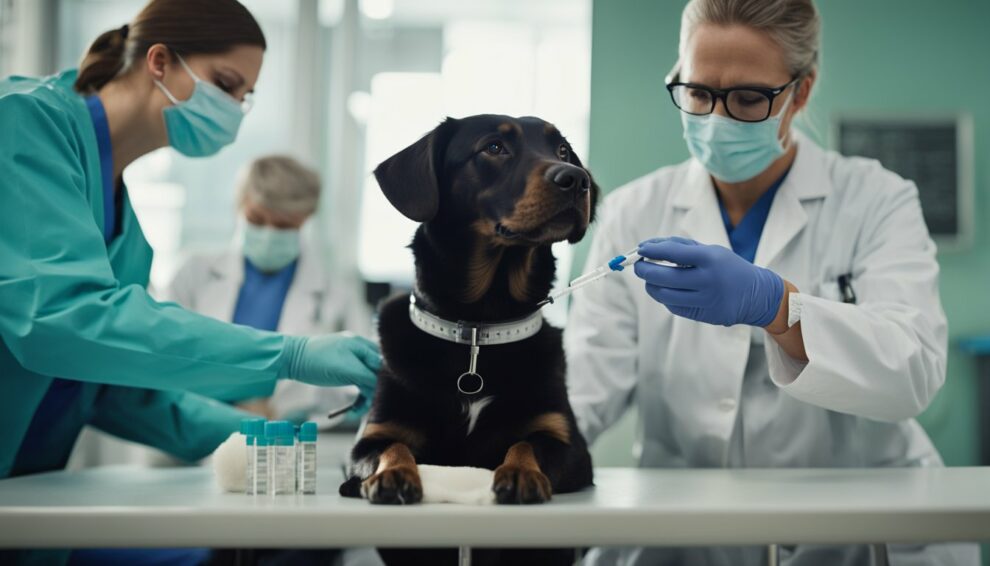When we bring a furry friend into our lives, we’re not just getting a pet, we’re adding a family member who needs care and protection.
One essential part of that protection for our canine companions is vaccinations.
The DHPP vaccine, commonly known among vets and pet owners alike, is a core vaccine for dogs.
It offers a shield against four serious diseases: canine distemper, infectious hepatitis, parvo, and parainfluenza—hence the acronym DHPP.

As responsible pet parents, it’s our job to understand what these vaccinations do and to consider whether they’re necessary for our puppies and adult dogs.
Deciding to vaccinate is a critical decision.
The DHPP is often recommended by veterinarians because it tackles diseases that can be severe or even fatal, especially for young pups with vulnerable immune systems.
However, just like any medical intervention, vaccinations come with questions and considerations.
It’s natural for us to wonder about potential side effects or if every vaccine is necessary for our dog’s health and lifestyle.
While veterinary guidance is paramount, getting to know the ins and outs of the DHPP vaccine helps us make informed choices about our dogs’ health care.
Let’s dive into the particulars of the DHPP vaccine and explore the reasons why it might—or might not—be right for our canine family members.
Understanding DHPP Vaccine Components

In this section, we’ll examine the four crucial diseases that the DHPP vaccine targets.
This combination vaccine is key in helping protect our furry friends from some serious health threats.
Distemper and Its Effects
Canine distemper virus is a highly contagious and serious disease that affects a dog’s respiratory, gastrointestinal, and nervous systems.
In the DHPP vaccination, the Distemper component helps build immunity by exposing the dog’s immune system to a safer form of the virus.
Hepatitis: CAV-1 and CAV-2
The Hepatitis part of the DHPP vaccine protects against two types of canine adenovirus: CAV-1 and CAV-2.
CAV-1 is associated with infectious canine hepatitis, which can cause liver damage, while CAV-2 is linked to respiratory illness.
Immunization helps prevent these forms of hepatitis from developing into severe conditions.
Canine Parvovirus: A Severe Threat
Canine parvovirus is notorious for its ability to cause severe, sometimes fatal, intestinal disease.
Our pups are immunized through the DHPP vaccine to help them resist this aggressive virus effectively.
Parainfluenza and Respiratory Health
Lastly, the Parainfluenza component of the DHPP vaccine is crucial in protecting against the respiratory virus known as canine parainfluenza, which is one of the contributors to the canine infectious respiratory disease complex, often referred to as kennel cough.
The Significance of Core Vaccines

When it comes to protecting our furry friends from common and serious infectious diseases, core vaccines play an essential role.
They are the foundation of a dog’s preventative health care regimen and are recommended for dogs regardless of their lifestyle, geographic location, or breed.
Distinguishing Core and Non-Core Vaccines
Core vaccines are deemed necessary for all dogs due to the widespread risk and severity of the diseases they prevent.
For example, the DHPP vaccine immunizes against diseases such as distemper, hepatitis, parvovirus, and parainfluenza.
On the other hand, non-core vaccines are given based on a dog’s specific risk factors and exposure, such as lifestyle and geographic location.
When Are Booster Shots Necessary?
Booster shots are follow-up doses of a vaccine, given periodically to “boost” the immune system.
After the initial series of vaccinations, booster shots for the core vaccines, including rabies and DHPP, are typically required.
The timing of these boosters can depend on several factors, including the type of vaccine used and our dog’s health and lifestyle.
Regular booster shots help maintain immunity against dangerous diseases over the course of a dog’s life.
Potential Side Effects of Vaccination

When we choose to vaccinate our dogs, we’re helping to protect them from certain serious diseases.
However, it’s crucial to be aware that, like any medical intervention, vaccinations can have side effects.
Some are expected and mild, while others are more severe and warrant immediate attention.
Common Reactions to Vaccines
Mild and Common Side Effects:
After vaccination, it’s quite normal for dogs to experience some minor side effects.
These typically resolve without needing any treatment:
- Soreness or Swelling at the injection site
- A slight Fever
- Lethargy or reduced energy levels
- Loss of Appetite
- Minimal Discomfort or Pain
These side effects usually clear up within a day or two.
It’s our way of knowing that the immune system is responding to the vaccine.
Gastrointestinal Reactions:
Some dogs might also encounter mild gastrointestinal issues, such as:
- Vomiting
- Diarrhea
These reactions, although unwelcome, are also transient and commonly resolve without medical intervention.
Recognizing Serious Complications
Severe Vaccine Reactions:
Although rare, it’s important for us to recognize the signs of a serious reaction to a vaccine, which may include:
- Seizures
- Difficulty Breathing or severe Coughing
- Facial Swelling
- Collapse
- Severe Allergic Reaction (anaphylaxis)
- Persistent Vomiting or Diarrhea
If you observe any of these signs, it’s essential to contact your veterinarian immediately.
Autoimmune Diseases:
In very rare instances, vaccination may trigger an autoimmune response where the body’s immune system starts attacking its own cells and tissue.
While the risk is very low, awareness is key to ensure timely medical attention if required.
Understanding the potential side effects of the DHPP vaccine for dogs helps us make informed decisions about our dog’s health care and be better prepared to respond if the need arises.
Vaccination Schedules and Considerations

Before the first H3, we want to ensure that our furry friends receive their vaccinations at the right time, with due consideration given to their early-life immunity and current health status.
Each step on the vaccination timeline is crucial for their long-term wellbeing.
Establishing a Proper Schedule for Vaccines
When we talk about vaccination schedules for dogs, it’s important to follow guidelines that are designed to optimize the effectiveness of each vaccine.
The American Animal Hospital Association (AAHA) has guidelines suggesting puppies should start their series of vaccines at around 6 to 8 weeks of age and continue every 3 to 4 weeks until they are at least 16 weeks old.
For adult dogs, the timing of booster vaccines can vary.
It is imperative to consult with veterinarians for specific schedules that suit the individual needs of our pets.
Dealing with Maternal Antibodies in Puppies
Maternal antibodies protect newborn puppies from infections, but they can also interfere with vaccinations.
The presence of these antibodies is why puppy shots are structured in a series; once the maternal antibodies wane, usually at around 6-14 weeks of age, the vaccines can take effect.
We rely on research to guide us on how to balance this delicate timing.
Considering Titer Testing
A titer test measures the level of antibodies present in the blood, offering us insight into a dog’s immune response.
Titer testing can inform us whether a dog has responded to a vaccine or whether they are in need of a booster shot.
It’s a useful tool we have to ensure our dogs aren’t over-vaccinated, and veterinarians may recommend it as part of the decision-making process, per the American Veterinary Medical Association.
However, it is not a full replacement for vaccinations, particularly in young animals that have not yet built a solid immune response.
Why Some Owners Choose to Decline DHPP
When we consider vaccinating our dogs, we’re often faced with a complex decision-making process.
In the case of the DHPP vaccine, this process involves weighing the likelihood of disease against potential risks associated with vaccination.
Risk vs. Benefit Analysis
Our furry friends rely on us to weigh the risks and benefits of the DHPP vaccine.
Some of us worry about the potential for vaccine reactions, which can range from mild discomfort to, in rare cases, severe allergic reactions.
The cost of vaccinations is also a consideration, as veterinary care, including preventive measures like vaccines, can add up financially.
We’re also mindful of the concept of over-vaccinating our pets, a concern highlighted by recent research suggesting that not every dog may need to be vaccinated as frequently as has been the norm.
Exploring Natural Immunity and Alternatives
In our pursuit to protect our dogs, some of us explore the concept of natural immunity and alternatives to routine vaccination.
This includes the potential option of titer testing to measure a dog’s immunity levels to certain diseases, which may indicate that the DA2PP vaccine is not immediately necessary.
Additionally, there is attention to maintaining health through nutrition and holistic care to potentially reduce the need for vaccinations such as the leptospirosis vaccine, which is part of the broader spectrum DHLPP vaccine.















